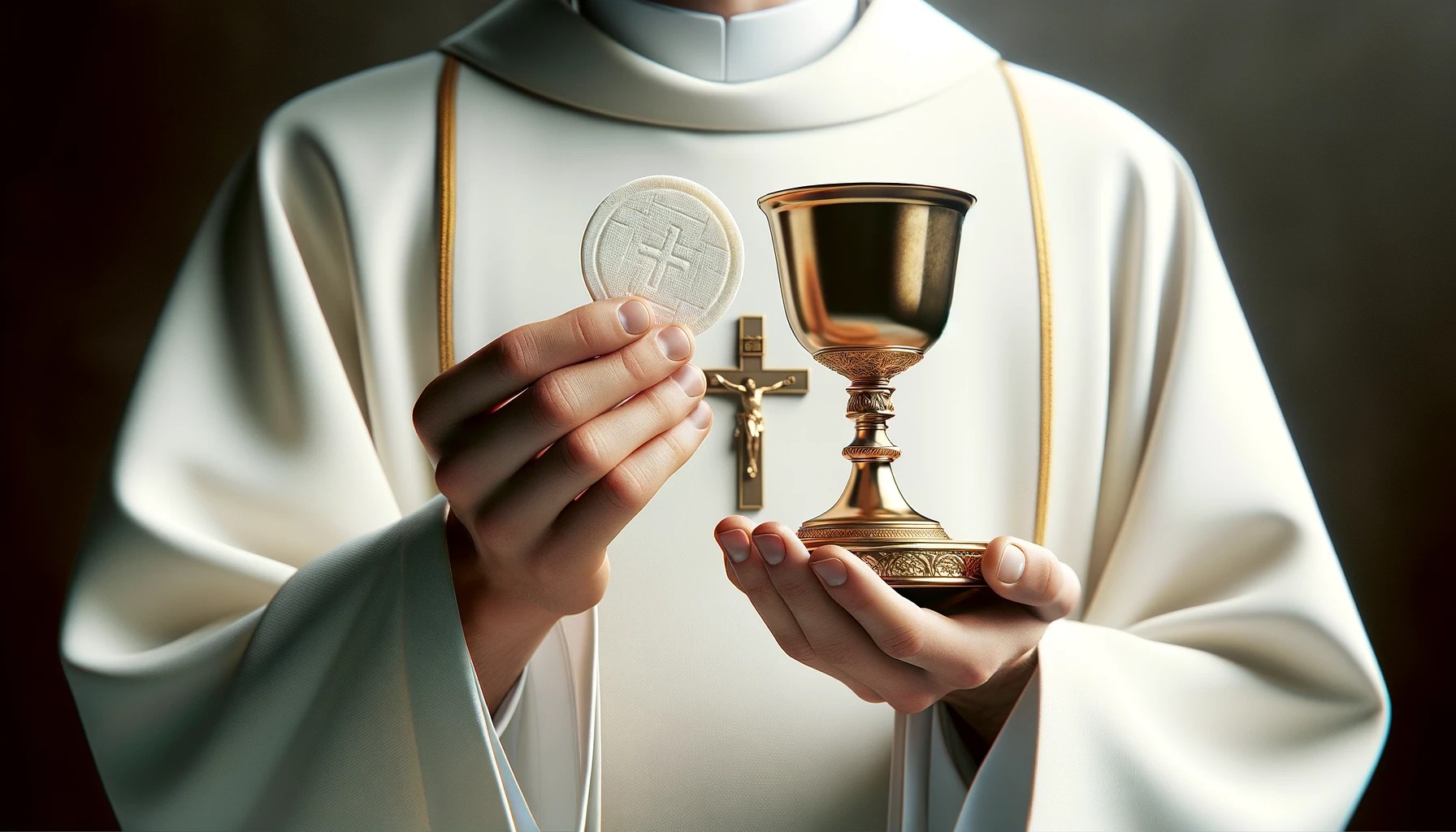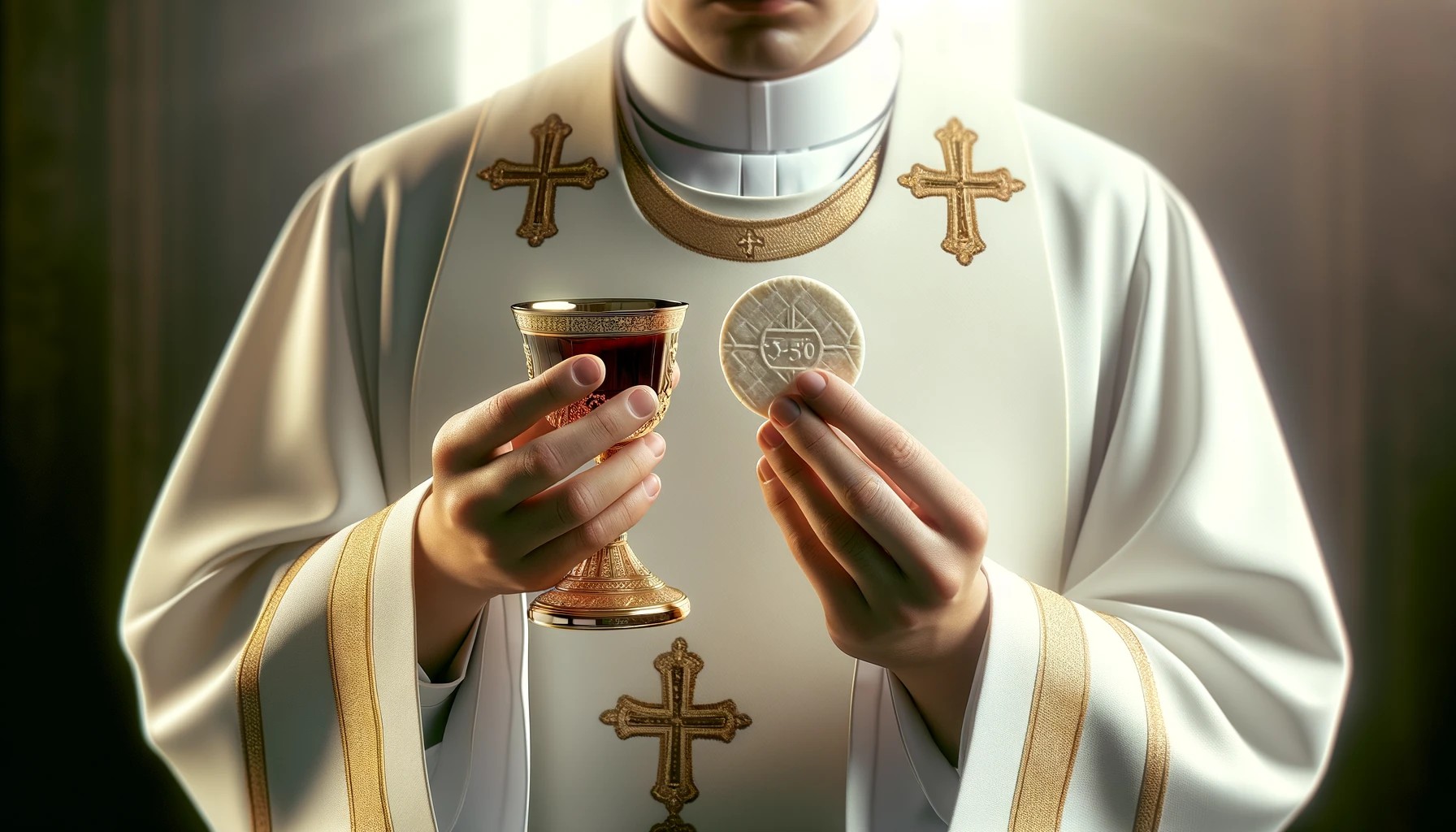Home>Theology and Spirituality>What Do You Say For Holy Communion


Theology and Spirituality
What Do You Say For Holy Communion
Published: February 19, 2024
Peter Smith, Editorial Director at Christian.net, combines deep insights into faith, politics, and culture to lead content creation that resonates widely. Awarded for his contributions to religious discourse, he previously headed a major organization for religious communicators, enhancing dialogue on faith's societal impacts.
Discover the significance and traditions of Holy Communion in theology and spirituality. Learn what to say and how to approach this sacred practice.
(Many of the links in this article redirect to a specific reviewed product. Your purchase of these products through affiliate links helps to generate commission for Christian.net, at no extra cost. Learn more)
Table of Contents
Introduction
Holy Communion, also known as the Eucharist, is a sacred and revered practice in many Christian traditions. It holds profound significance as a symbolic reenactment of the Last Supper, where Jesus Christ shared bread and wine with his disciples, instructing them to partake in remembrance of him. This act of sharing in the body and blood of Christ is central to the Christian faith and is regarded as a deeply spiritual and transformative experience.
The ritual of Holy Communion is a tangible expression of the believer's union with Christ and fellow members of the faith community. It serves as a powerful reminder of Christ's sacrificial love and the redemptive grace extended to humanity. As such, the act of partaking in Holy Communion is not merely a religious custom but a profound spiritual encounter with the divine.
In this article, we will delve into the theological and spiritual significance of Holy Communion, explore its importance within the Christian faith, and provide insights into the appropriate words and sentiments to express before and after receiving this sacred sacrament. Whether you are a seasoned participant in Holy Communion or someone seeking to understand its deeper meaning, this exploration aims to illuminate the richness and depth of this sacred practice.
Read more: What Do You Say For A First Communion
Understanding Holy Communion
Holy Communion, also referred to as the Eucharist, holds profound significance within Christian theology and spirituality. At its core, Holy Communion is a symbolic reenactment of the Last Supper, a pivotal event in the life of Jesus Christ. During this final meal with his disciples, Jesus shared bread and wine, instructing his followers to partake in remembrance of him. This act of sharing in the body and blood of Christ is deeply symbolic, representing the spiritual nourishment and unity of believers with Christ and one another.
The theological underpinnings of Holy Communion are rooted in the concept of transubstantiation or, in some traditions, consubstantiation. According to Catholic and Orthodox beliefs, transubstantiation holds that the bread and wine, through the act of consecration by a priest, become the actual body and blood of Christ while retaining the appearance of bread and wine. This transformation is seen as a mystical and sacred process, signifying the real presence of Christ in the Eucharistic elements. On the other hand, in Protestant traditions, consubstantiation or a symbolic understanding of the Eucharist is prevalent, emphasizing the spiritual significance of the bread and wine as representations of Christ's body and blood.
Beyond its theological implications, Holy Communion is a deeply spiritual practice that fosters a sense of unity, gratitude, and reverence among believers. It serves as a tangible expression of the believer's union with Christ and fellow members of the faith community. The act of partaking in Holy Communion is not merely a religious ritual but a transformative encounter with the divine, inviting participants to reflect on Christ's sacrificial love and the redemptive grace extended to humanity.
In essence, Holy Communion stands as a sacred bridge between the earthly and the divine, inviting participants to partake in a profound spiritual feast that nourishes the soul and strengthens the bonds of faith and fellowship. This understanding of Holy Communion as a deeply symbolic and spiritually enriching practice underscores its central place within Christian worship and devotion.
The Importance of Holy Communion
Holy Communion holds immense significance within the Christian faith, serving as a cornerstone of worship and spiritual nourishment for believers. Its importance can be understood through various theological, spiritual, and communal dimensions:
-
Spiritual Nourishment: Holy Communion is regarded as a source of spiritual sustenance, providing believers with a tangible encounter with the presence of Christ. Through the act of partaking in the bread and wine, participants symbolically receive the grace and nourishment of Christ's redemptive sacrifice, strengthening their faith and deepening their spiritual connection with God.
-
Remembrance and Thanksgiving: The ritual of Holy Communion invites believers to remember and give thanks for the sacrificial love of Christ. It serves as a poignant reminder of Christ's ultimate act of love and selflessness, prompting gratitude and reverence among participants as they reflect on the profound significance of Christ's sacrifice for the salvation of humanity.
-
Unity and Fellowship: Holy Communion fosters a sense of unity and fellowship within the faith community. As believers partake in the Eucharist together, they affirm their shared identity as members of the body of Christ, transcending differences and coming together in a sacred act of communion. This communal aspect of Holy Communion reinforces the bonds of love and mutual support among believers.
-
Healing and Restoration: For many, Holy Communion represents a moment of spiritual healing and restoration. It offers a space for believers to seek solace, forgiveness, and renewal, finding comfort in the assurance of God's grace and mercy. The act of partaking in the Eucharist can bring about a sense of inner peace and wholeness, providing a sacred opportunity for spiritual healing and reconciliation.
-
Proclamation of Faith: Through Holy Communion, believers publicly proclaim their faith in the life, death, and resurrection of Jesus Christ. The act of partaking in the Eucharist serves as a visible expression of one's commitment to Christ and the foundational truths of the Christian faith, bearing witness to the redemptive work of Christ and the hope found in the gospel message.
In essence, the importance of Holy Communion extends far beyond a mere religious ritual; it encompasses the spiritual, communal, and transformative dimensions of the believer's journey. As a sacred practice that embodies the core tenets of Christian faith, Holy Communion stands as a profound and indispensable aspect of worship, reflection, and spiritual nourishment for believers across diverse Christian traditions.
What to Say Before Receiving Holy Communion
Before partaking in Holy Communion, it is customary for believers to engage in moments of reflection, prayer, and preparation. These moments serve as a sacred prelude to the act of receiving the Eucharistic elements and offer an opportunity to express reverence, gratitude, and spiritual readiness. While the specific words spoken may vary across Christian traditions, the sentiments conveyed often revolve around themes of humility, repentance, gratitude, and a deep sense of awe in the presence of the divine.
One common expression before receiving Holy Communion is a prayer of confession and repentance. This prayer acknowledges human fallibility and the need for divine mercy and forgiveness. It reflects a humble recognition of one's imperfections and a sincere desire for spiritual cleansing and renewal before partaking in the sacred elements. Through this prayer, believers express contrition and seek reconciliation with God, preparing their hearts to receive the grace and transformative power symbolized in the bread and wine.
Additionally, believers often express gratitude and reverence in their pre-Communion prayers. Gratitude is directed towards God for the gift of salvation and the redemptive sacrifice of Christ, which the Eucharist symbolizes. This expression of thankfulness reflects a deep appreciation for God's love and grace, underscoring the profound significance of the act of partaking in Holy Communion. Furthermore, believers convey a sense of reverence and awe in the presence of the divine, acknowledging the sacredness of the moment and the spiritual significance of receiving the body and blood of Christ.
In some traditions, believers may also recite specific prayers or liturgical texts that emphasize the themes of unity, faith, and spiritual preparation. These prayers often serve to reaffirm the believer's commitment to Christ and the community of faith, emphasizing the communal aspect of Holy Communion and the shared identity of believers as members of the body of Christ.
Ultimately, the words spoken before receiving Holy Communion encapsulate a profound blend of humility, gratitude, reverence, and spiritual readiness. They reflect the believer's deep awareness of the sacredness of the Eucharistic moment and their earnest desire to partake in the transformative grace and communion with Christ and fellow believers.
What to Say After Receiving Holy Communion
After partaking in the sacred act of Holy Communion, believers often engage in moments of reflection, gratitude, and prayer. These post-Communion expressions serve as a continuation of the spiritual journey initiated through the reception of the Eucharistic elements and offer an opportunity to articulate the profound impact of the experience on the soul.
One common sentiment expressed after receiving Holy Communion is a prayer of thanksgiving. This prayer is a heartfelt expression of gratitude to God for the spiritual nourishment received through the body and blood of Christ. Believers acknowledge the transformative power of the Eucharist and offer thanks for the opportunity to partake in this sacred sacrament, recognizing it as a profound encounter with the living presence of Christ.
In addition to gratitude, believers often engage in moments of silent reflection and contemplation after receiving Holy Communion. This reflective silence allows individuals to internalize the spiritual significance of the Eucharistic experience, fostering a deep sense of communion with Christ and fellow believers. It provides a sacred space for personal communion with God, enabling believers to meditate on the redemptive love of Christ and the implications of this spiritual encounter for their lives.
Furthermore, believers may express a renewed commitment to living out the principles of faith and love exemplified by Christ. This post-Communion affirmation signifies a desire to embody the teachings of Christ in daily life, extending the grace and compassion experienced during Holy Communion to others. It serves as a pledge to walk in the footsteps of Christ, seeking to manifest his love and grace in the world as a living testimony to the transformative power of the Eucharistic encounter.
Ultimately, the words spoken after receiving Holy Communion encapsulate a profound sense of gratitude, reflection, and recommitment to the principles of faith and love. They signify the enduring impact of the Eucharistic experience on the believer's heart and soul, inspiring a renewed sense of spiritual purpose and a deepened connection to the divine and the community of faith.
Read more: When Do You Do Holy Communion
Conclusion
In conclusion, Holy Communion stands as a sacred and transformative practice that holds profound theological, spiritual, and communal significance within the Christian faith. It serves as a symbolic reenactment of the Last Supper, embodying the spiritual nourishment, unity, and remembrance central to the Christian journey. The act of partaking in the body and blood of Christ through the Eucharistic elements symbolizes a deep communion with the divine and fellow believers, fostering a sense of gratitude, reverence, and spiritual renewal.
The theological underpinnings of Holy Communion, whether viewed through the lens of transubstantiation, consubstantiation, or symbolic representation, underscore its role as a tangible expression of the believer's union with Christ and the faith community. This sacred practice transcends mere ritualistic observance, inviting participants into a profound encounter with the living presence of Christ and the redemptive grace extended to humanity.
The importance of Holy Communion is multifaceted, encompassing spiritual nourishment, remembrance, unity, healing, and proclamation of faith. It serves as a source of spiritual sustenance, offering believers a tangible experience of Christ's redemptive sacrifice and strengthening their faith. Furthermore, Holy Communion fosters a sense of unity and fellowship, transcending differences and affirming the shared identity of believers as members of the body of Christ.
Before receiving Holy Communion, believers engage in moments of reflection, gratitude, and spiritual preparation, expressing humility, contrition, and a deep sense of awe in the presence of the divine. After partaking in the Eucharistic elements, believers continue their spiritual journey through expressions of thanksgiving, reflection, and a renewed commitment to embodying the principles of faith and love in their lives.
In essence, Holy Communion serves as a sacred bridge between the earthly and the divine, inviting believers into a transformative encounter with the living presence of Christ and the communion of the faith community. It embodies the core tenets of Christian faith, offering a space for spiritual nourishment, reflection, and communal unity. As believers partake in this sacred sacrament, they are reminded of Christ's sacrificial love and the enduring grace that sustains their faith journey.
Ultimately, Holy Communion stands as a timeless and profound expression of the believer's union with Christ, encapsulating the essence of Christian devotion, unity, and spiritual renewal. It continues to be a sacred practice that enriches the spiritual lives of believers and fosters a deep sense of communion with the divine and the community of faith.














